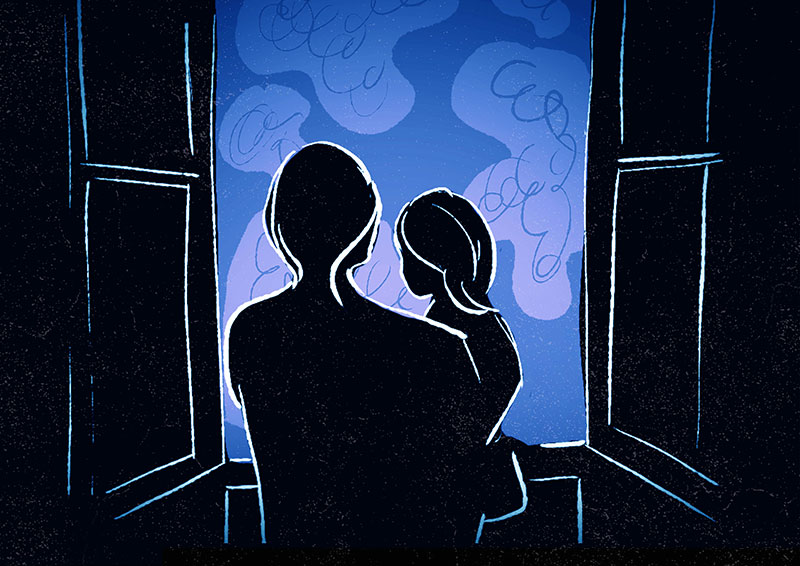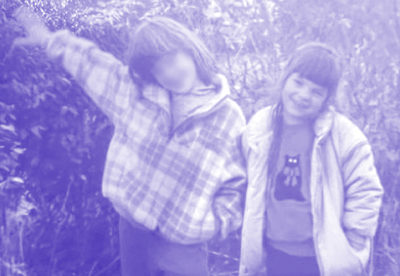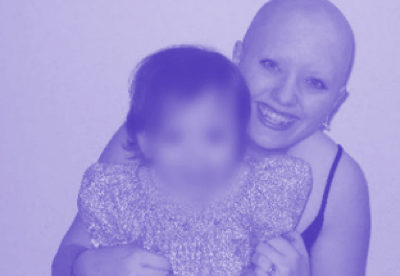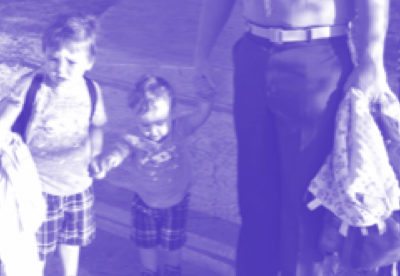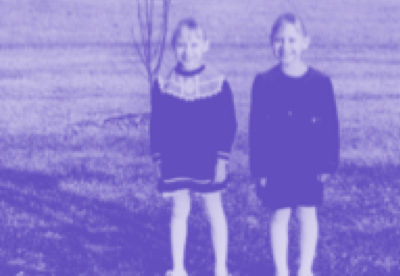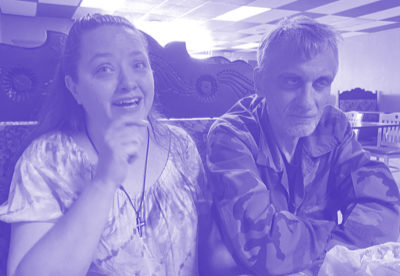SEASON 06 | EPISODE 02
Lisa’s second child, Angellyn, was born prematurely and in a medically fragile state. Mishelle and her aunt Sabrina recount a troubling pattern: just as Angellyn would be cleared for hospital discharge, doctors would abruptly reverse course, warning that she might not survive the night.
Andrea speaks to a nurse, “Judy”, who was working in the Pediatric Intensive Care Unit (PICU) at the time of Angellyn’s hospitalizations. Judy walks us through the medical team’s growing suspicions and their decision to install surveillance cameras in Angellyn’s hospital room. The footage reveals deeply disturbing behavior by Lisa and Carey’s utter compliance, prompting an investigation into the parents. Ultimately, custody of both Mishelle and Angellyn was revoked, and the children were placed with their maternal grandparents.
***
This season covers sensitive subject matter involving allegations of child abuse, medical child abuse (also known as Munchausen by proxy), and the death of a minor. All information presented is based on court records, first-person interviews, contemporaneous documentation, and publicly available sources.
The podcast includes personal statements and perspectives from individuals directly involved in or affected by these events. These accounts represent their experiences and interpretations, and some statements reflect opinions that may be emotionally charged. Where appropriate, the reporting team has verified claims through official records or corroborating sources.
Nothing in this podcast should be interpreted as a legal conclusion or diagnosis. All subjects are presumed innocent unless convicted in a court of law. This podcast is intended for informational and public interest purposes.
This podcast contains audio excerpts from two phone conversations recorded in the states of Georgia and Alabama, respectively. Both recordings were obtained by a third-party source, who acted in accordance with the relevant one-party consent laws of those states, which allow for the lawful recording of a conversation with the consent of one participant.
These recordings were subsequently shared with the producers of this podcast after the fact, and were not made by or at the direction of the podcast team or its parent organization.
The podcast producers have made good-faith efforts to confirm the legal compliance of the original recordings, and are presenting these materials in the context of public interest reporting. The inclusion of this audio is intended for journalistic, educational, and documentary purposes in alignment with the principles of fair use and First Amendment protections.
Listeners are advised that the views expressed in the recordings are those of the individuals speaking and do not necessarily reflect the views of the producers or affiliated entities.
Host Andrea Dunlop:
https://www.andreadunlop.net
For behind-the-scenes photos:
https://www.instagram.com/andreadunlop/
Support the show and get exclusive bonus content:
https://patreon.com/NobodyShouldBelieveMe
For information and resources:
https://www.munchausensupport.com
The American Professional Society on the Abuse of Children’s MBP Practice Guidelines can be downloaded here.
More about Dr. Marc Feldman:
https://munchausen.com
Transcript
[00:00:00] Mishelle: So I am currently on my way to tell my mom and dad about the podcast, um, and that I’m gonna sit down and, and do it. Um,
[00:00:19] Mishelle: I [00:00:20] feel like my fight or flight has kicked in. I feel like I’m gonna throw up. Um, and I don’t know, I’ve, I’ve been putting it off for a while. File. I have made dates that I planned on doing it, and then I changed it for one reason or another. Um, but [00:00:40] I’m just, I’m just tired of feeling like I’m hiding it. Um, and something my therapist and I have talked about, and I’ve tried to really work on something she said that just like stuck with me was.
[00:00:56] Mishelle: I have put so much [00:01:00] thought and process and energy into worrying about how this whole thing was going to impact my mom and how it was gonna impact her life and what it could potentially do or not do, or how she was gonna handle it or not handle it. Um, and my [00:01:20] therapist was just like, do you think she honestly stopped to think about the.
[00:01:26] Mishelle: With the same amount of care, the number of podcasts that she’s been on to tell your brother’s story and to be able to tell her side of things, not that she’s publicly spoken about, [00:01:40] anything to do with my sister or anything to do with like my other, my.
[00:01:44] Andrea: Lisa McDaniel has done plenty of interviews about her work at the Guthy Jackson Foundation, but no one’s exactly asking her tough questions.
[00:01:52] Andrea: The media coverage of Lisa in fact paints her as heroic
[00:01:56] Lisa: as a caregiver. I feel like you have lost part of the [00:02:00] life you knew beforehand, before your loved one got sick because your life changes. So that grief is really real. Their caregiver mourns their whole way of living, and I think tho that grief is very, very real.
[00:02:11] Lisa: That’s such a great point.
[00:02:13] Podcast Host: It’s just so selfless, the work that you do, you put yourself in the situation to see other people doing well, [00:02:20] and, and that’s, that’s just a tremendous selfless act every day. Well,
[00:02:25] Lisa: you know, I appreciate you saying that, Corey, but as you know, I, I don’t like to be patted on the back for those things.
[00:02:30] Lisa: I love what I do. I love working with the people I that I work with. I love being able to help patients. That’s who I am at heart as a helper, and again, I find that more selfish [00:02:40] than anything because I think I get just as much out of this as what the people that I’m able to help do.
[00:02:45] Andrea: That’s Lisa McDaniel on a podcast called The Power of Rare Chatting about her work with a colleague.
[00:02:52] Andrea: A helper, a caregiver, selfless. That’s the brand that Lisa has cultivated in her 12 year career as the director of patient [00:03:00] advocacy at the Guthy Jackson Foundation. To Michelle’s point, Lisa rarely mentions the existence of her other children, let alone her conviction for abusing one of them. And the folks who hired Lisa to do this advocacy work with NMO patients and their families.
[00:03:15] Andrea: Turns out. They don’t exactly have the full story.
[00:03:21] Intro
[00:03:21] [00:03:20]
[00:03:21] Andrea: People believe their eyes. That’s something that is so central to this topic because we do believe the people that we love when they’re telling us something. If we didn’t, you could never make it through your day. I’m Andrea Dunlop, and this is, nobody Should Believe me.
[00:03:42] Ad Break[00:03:42] Act 1
[00:03:42] [00:03:40]
[00:03:42] Andrea: Where, where would you like to begin?
[00:03:45] Mishelle: Um, I don’t know. I don’t know. Where do you begin? Um, geez. I mean, I guess we can just begin with my sister. Right? So she was born and I just [00:04:00] remember. Being told that she was really sick. Um, and I was staying with my other set of grandparents, my dad’s parents for a little while because they were in the hospital.
[00:04:12] Mishelle: And so my mom, um, kind of left me there. And was in the hospital with my sister and pretty much from what I, what I remember, just [00:04:20] pretty much lived there. Like she was there. Um, my sister was born at like 27 weeks. Um, she was born pretty early, especially, this was like nine, seven, and we were in Savannah, Georgia.
[00:04:28] Mishelle: And so that was pretty early, you know. Um, and so she just pretty much lived there with her.
[00:04:37] Andrea: In the last episode, we heard from Lisa’s younger [00:04:40] sister Sabrina, about her bizarre and difficult history with her sister and Lisa’s odd behavior during her pregnancy with her second child Angelan. And it’s these events that lead up to this story taking a very dark turn.
[00:04:54] Andrea: In a setup that is unfortunately all too familiar from these cases, Lisa McDaniel gave [00:05:00] birth to Angeline Terrifyingly early on May 30th, 1997, when the baby was months from her due date. This early labor seems likely to be related to the fact that, as Sabrina witnessed and recounted in the last episode, Lisa kept falling down the stairs.
[00:05:17] Andrea: A detail that parallels many other [00:05:20] stories, including the Hopi Barr case that we covered in season one
[00:05:24] Sabrina: when she was first born. I don’t remember how many. I wanna say 28 weeks gestation. Um, we were led to believe that it would be very touch and go for a long time because she was a pound 12 ounces and [00:05:40] we couldn’t touch her because like literally her skin was so frail, she would rip.
[00:05:44] Sabrina: Like her skin would drip
[00:05:48] Andrea: a baby born as early and as small as Angelan is certain to have complications. And her life began with a lengthy stay in the neonatal intensive care unit.
[00:05:59] Sabrina: You would go [00:06:00] in and you would see her and she’ll do really good, and then she may not do so well, but if we could get, you know, her lungs developed because you could not hear her.
[00:06:09] Sabrina: Cry like she, her lungs were so weak and stuff that her mouth would open like she was crying, but you physically could not hear it.
[00:06:17] Andrea: Michelle had been looking forward to having a baby [00:06:20] sister, but the reality of Angelan being born so fragile was harrowing.
[00:06:25] Mishelle: I had been waiting all day to go back and see her in the ICUI finally, I got to go back and, and see her for like just a minute.
[00:06:32] Mishelle: It was literally like just a minute, and I don’t remember all of it. I hate that, but I remember seeing a lot of the pictures [00:06:40] and so I imagine for me that young, that was probably a super scary like place to see her because she was hooked up to every cord imaginable, and IVs and a trach and a feeding tube, and like all these things.
[00:06:52] Mishelle: That’s really my first core memory, I think is like her
[00:06:59] Andrea: after three [00:07:00] months. Angeline was discharged in August of 1997 with a lengthy list of complications including breathing and feeding issues that were due to her premature birth. Between trips to the hospital and Michelle being passed off to grandparents.
[00:07:14] Andrea: Michelle got the message. Her care and her needs were low on the priority list. [00:07:20]
[00:07:20] Mishelle: Sometimes my dad would come pick me up and we would go back to Savannah and I would stay for like a weekend or something. So I remember them really, really pressing of how medically fragile my sister was, to the point where they were like, you have to wash your hands and you have to be very careful and you can’t have germs and yada yada.
[00:07:35] Mishelle: And so there was an instance where I literally was washing my hands. So often, [00:07:40] like I had huge like rashes on my hands because I had just washed my hands like till they were raw, because I was like, I’m just taking care of my sister. That was the core of most of my life. It was how my sister was doing, how my mom was doing when they were coming home.
[00:07:53] Mishelle: It’s like this overwhelming sense of keeping an eye on everybody and everything and like. Just [00:08:00] making sure that they were okay
[00:08:02] Andrea: even after Angela’s initial discharge from the hospital. She was never out for long, and the first 21 months of her life were a series of repeated hospitalizations.
[00:08:12] Sabrina: An emotional coaster.
[00:08:13] Sabrina: You’re emotional already, um, but you would get a call. Oh, they’re going, [00:08:20] they’re talking about letting Angel come home if she keeps doing well, and then two days later you would get a call. Angel’s so sick if you want to see her. They say she may not make it through the night. If you want to see her come.
[00:08:34] Sabrina: I believe and was told
[00:08:35] Mishelle: like she was fighting for her life and that weight, just walking around with [00:08:40] it all the time. My life revolved around that and there was like a pond that my grandparents had had that, you know, me and my granny would walk down sometimes and spend some time at the pond and like.
[00:08:50] Mishelle: Listening to the birds, and I don’t know if you can hear in the background, there’s so many like birds and stuff out, because I’m talking about all this in my grandparents’ house, you could constantly hear [00:09:00] birds chirping. My days revolved around the phone call. It was, you know, it was waiting for that phone call of how my sister was today.
[00:09:14] Mishelle: And I remember, I would like, I remember asking granny like, have they called today? What’s going [00:09:20] on? And
[00:09:20] Andrea: um, this was a lonely time for Michelle, who at six should have been taking her first big strides into the wider world as a kindergartner, except the McDaniels had decided not to send her.
[00:09:33] Mishelle: So like my dad would come back and forth and visit like on weekends and stuff.
[00:09:37] Mishelle: Um, me, ’cause I was staying at my grandparents’ house when my [00:09:40] mom stayed. And then occasionally they would both like come and I don’t remember how often it was or anything. I just remember sometimes they would both come and see me at my grandparents’ house while my sister was in the hospital and they would come and like try and do some like brief weird like homeschooling things.
[00:09:55] Mishelle: But it was also like. We’re doing this once every however [00:10:00] often. Very much. Not like a daily, you know, thing because they were kind of opposed, it feels like, to me, going to public school for a while. Do you
[00:10:09] Andrea: have any sense of what their beef was with sending you?
[00:10:12] Mishelle: Um, it, I, I feel like. For best I can gather it was very religious based.
[00:10:18] Mishelle: Um, because we were, I was [00:10:20] very religious growing up and my dad was like a Baptist preacher growing up, and so it, it felt very, like my homeschooling curriculum was very like religious based and I can’t remember the. The actual thing they use now. But like, um, I, I guess I had like questions of like, why, like I couldn’t be over there.
[00:10:36] Mishelle: Like if I’m here, you know, why can’t I be with my parents or why can’t I [00:10:40] stay there or whatever. And like she was in ICU, um, so there was no like feasible way for me to be in there. Like I wasn’t even supposed to be in there with her at all. Um. But I would go sometimes, like over weekends and stuff, like I would go, um, either with one set of grandparents or the other.
[00:10:56] Mishelle: Sometimes my dad would come pick me up and we would go back to Savannah and I would [00:11:00] stay for like a weekend or something. Um, so I remember that. I remember a lot of back and forth
[00:11:07] Andrea: and every time Angeline’s Health started to improve, it would take another nose dive
[00:11:13] Sabrina: as she grew and got bigger, got stronger.
[00:11:18] Sabrina: It was almost worse than when [00:11:20] she was for first born, because you’re thinking, okay, you’re on the road to get to come home. They started making out a plan, okay, this needs to happen. This needs to happen. These things need to happen. If she can do so many days on these feeds and not, you know, have any issues, and her heart rate stay up and [00:11:40] her, her breathing and everything stay intact, and this is the plan of action to go home.
[00:11:44] Sabrina: That’s when it was. Okay, Angeline may not make it through the night. If you want to see her come on.
[00:11:51] Andrea: So she would be improving. Mm-hmm. And kind of in this preparation for discharge. Mm-hmm. And then suddenly take a turn towards, mm-hmm. As you understood it, [00:12:00] like imminent death.
[00:12:00] Sabrina: Yes. That’s how I understood it.
[00:12:03] Sabrina: Like when you get that call. Yeah, the doctor says she may not make it through the night, and you’re still thinking, okay, at this time you have to understand. We didn’t have a clue. We bought into everything that we were told.
[00:12:18] Andrea: As a parent, there’s [00:12:20] nothing more frightening than the idea of something happening to your baby. Both of my babies, luckily, were born full term and with no complications, and even so, those early days are really hard. I remember not being able to sleep some nights because I would stir awake at every little peep they made.
[00:12:38] Andrea: I struggled with [00:12:40] breastfeeding with my first, and I remember just torturing myself to make it work. It’s hard to overstate how, especially in those first few months when your baby is just so helpless and your hormones are raging. Every cell in your body turns itself over to keeping this tiny, precious thing alive, and again, that’s without complications.[00:13:00]
[00:13:00] Andrea: Angela spent the first 21 months of her life critically ill, so it’s easy to see why the family rallied around. Lisa and Carrie, parents deserve support and babies. Deserve every chance at a healthy life.
[00:13:34] Ad Break – Act 2
[00:13:34] [00:13:20]
[00:13:34] Andrea: How did you first come to meet the McDaniel family?
[00:13:38] Judy: Just as a [00:13:40] patient in the picu? So she was an ex preemie. I honestly don’t remember the very first time I met them. I. But it wasn’t unusual.
[00:13:47] Andrea: This is Judy, which is a pseudonym we’ll be using to protect her identity. She was a nurse in the pediatric intensive care unit, or the PICU in Savannah at the time.
[00:13:56] Andrea: Angelan was being treated there. Angelan was [00:14:00] born very premature. Was it pretty typical that you would see babies born on the more extreme end of being born premature? That they would have a lot of visits to the picu?
[00:14:11] Judy: Yeah, it wasn’t surprising back then to see them visiting a lot. If they got sick, they would not get sick the way your children or my children would get [00:14:20] sick.
[00:14:20] Judy: They could become very violently ill, and even in danger of death if they got sick with, let’s say sepsis or they had a very bad pneumonia, you know, there’s a lot of things that would make them, the physicians be very concerned about their outcome and that’s why they would need to be with us. So we could watch them very carefully.
[00:14:38] Andrea: Something I’ve become well [00:14:40] acquainted with making this show over the past few years is what strong stuff PICU and pediatric emergency room staff are made of. This is work that requires an extraordinary amount of empathy, calm and emotional endurance, and listening to parents about what’s going on with their child is a huge part of this work.
[00:14:58] Andrea: I would imagine there’s almost [00:15:00] no instance where you’re not meeting someone on one of the worst days of their life, right? If your child is in the picu, that is just an incredibly. Stressful and upsetting situation.
[00:15:11] Judy: Yes, it’s terror and inducing for pretty much everybody. It’s very stressful for all of them.
[00:15:17] Judy: Everybody has a story. Everybody [00:15:20] believes that their story is the most important, and so I always, I. Tried to be very cognizant of that when I was talking with them about what was going on with their children. And so I always believed I would have probably about five minutes to make that. I called it the click because I would just go in the room, start doing [00:15:40] stuff, and the minute I felt that little click, I was like, yep.
[00:15:43] Judy: I’m good. I’ve connected with this family. Now I can just go in and do my job, but I want to put them at ease. I wanna see their shoulders come down. You know, I want them to be able to talk with me and not just have that awful deer in the headlights look. So it’s really important for me to make that [00:16:00] connection.
[00:16:01] Judy: Lisa, who
[00:16:02] Andrea: is still in her twenties at the time. Was reportedly charming and popular with the number of hospital staff who she’d often go to lunch with. Judy, however, had a different reaction as she explained to me and my producer, Taj, who is the other voice you’ll hear in this clip?
[00:16:18] Taj: Did you have a moment, [00:16:20] like a click with Lisa?
[00:16:23] Judy: I did not have that with her. What I had with her. I had the other reaction where the hackles stood up on the back of my neck is about the only way. And I thought, Hmm, this is somebody that is best for me not to be around. [00:16:40] And then some of the things that happened while Angelan was in the unit, like when she would, they used to have a phone outside the doors.
[00:16:48] Judy: So she would ring to come in and visit and there was one time we heard all this banging and we opened the door and she was like lying on the ground, outside the door looking like she was convulsing. It only lasted [00:17:00] a brief period of time. And then one time she said that somebody had tried to attack her outside of Ronald McDonald House.
[00:17:08] Judy: And the nurses, you know, we were all friends. They would tell me some of the things that she had confided in them about. And I was just, the more I. Was exposed to all of that. It [00:17:20] wasn’t so much what was happening clinically with Angela and at that particular time it was just the other stuff, just mm, mm-hmm.
[00:17:27] Andrea: Yeah. So you just had a bad vibe basically from her. Sounds like, and I mean, it also sounds like the take on Lisa at the hospital was that, that [00:17:40] she was. Quite capable of taking care of her child. This was not a situation where, um, because of course these situations do happen, right? Mm-hmm. Where a parent is having such severe mental health concerns that they’re not able to take care of their child adequately, and it doesn’t sound like that was anybody’s read on Lisa?
[00:17:59] Andrea: No, not at [00:18:00] all. Though. There were only brief periods during this time when Angeline was able to leave the hospital. Michelle has vivid memories of one homecoming in particular.
[00:18:10] Mishelle: She had like her own room at the crib and then there were still like tubes and like attached to her and like feeding tubes and like her breathing tubes and like all attached to her trach and [00:18:20] all this.
[00:18:20] Mishelle: And, but I remember like waking up in the middle of the night to her alarms just like blaring. ’cause I was like, I think I was like across the hall from her in my own bedroom. And I go in there and she’s not breathing and she’s like blue, like dark blue. And I remember like screaming for my parents. And my parents come and running in [00:18:40] there.
[00:18:40] Mishelle: And I remember my mom making just like this big deal out of me the next like two or three days that was like, you saved her life. Like you’re the Aries, why she’s alive and like all this. And really internalizing like, okay, well that’s just another sign. Like I gotta protect her. Like this is my job now.
[00:18:54] Andrea: And this traumatic event solidified Michelle’s understanding of her place in the household, [00:19:00] not as a child with needs of her own, but as a caretaker. As a rescuer. A heavy weight for tiny shoulders. To my adult ears. The logistics of this story seemed odd. If you have a baby this fragile, why is she not in the room with the parents?
[00:19:16] Andrea: Lots of babies sleep in the parents’ room when they’re little anyway, [00:19:20] and when my babies had so much as a bad cold, I’d want them near me throughout the night. This detail also stuck out to Sabrina. I can remember asking my husband,
[00:19:30] Sabrina: why do you, why did they put her in that room so far away, like, so far away where you, and at this point she still, when she cries, you still can’t, like, you can hear [00:19:40] her if you’re close to her, but you can’t, if even if you’re the next room over, you still can’t hear.
[00:19:45] Sabrina: Yeah. I mean, you. So she still like, you know, was very quiet. I was like, why would you, because that’s a lot for a little kid to come in and find. It never made sense to me why she was on so many machines and all this stuff, and you had [00:20:00] her where you couldn’t even hear
[00:20:00] Andrea: her. The medical team had been tracking Angeline’s troublesome pattern of declining each time she was on the precipice of going home from the hospital.
[00:20:10] Andrea: And they began to suspect that they weren’t getting all of the information from Lisa. So they were, they were in and out of the hospital. Sounds like in the hospital more. Mm-hmm. Um, you know, [00:20:20] for, for quite a long period of time. How did this all take a turn?
[00:20:26] Judy: I believe, if I remember correctly, that the physicians were concerned enough to send her for a second opinion in Atlanta.
[00:20:37] Judy: And while that they did that, they [00:20:40] installed the surveillance cameras in the room that she often stayed in, and they were getting to the point where she was having these infections that didn’t make a lot of. Sense with organisms that weren’t normally found in those particular areas of the body, which is why they sent her up to Atlanta and then came back.
[00:20:57] Andrea: As Sabrina explains, the doctors [00:21:00] weren’t the only ones who’d begun to suspect something was very wrong. And then my husband.
[00:21:07] Sabrina: Said like, and I was, but I’m like, when I say this, I was really mad at my husband at the time that he said this. He’s like, it’s just weird to me that she is so well, she can come [00:21:20] home and then, and less than a day, she so sick, she’s gonna die.
[00:21:25] Sabrina: He said, do you think your sister’s doing something to her? I thought I would beat him to death. I’m not kidding, because it just. How could you dare say that? You know? And they, [00:21:40] I’m like, don’t ever say that again. And he’s like,
[00:21:43] Andrea: I’m
[00:21:43] Sabrina: just
[00:21:43] Andrea: asking. As this dramatic cycle, continued things got increasingly tense for the whole family.
[00:21:49] Andrea: I.
[00:21:50] Mishelle: One time my mom had called from the hospital, and so I’m outside like playing with my friends or whatever, and my granny comes outside and she was just like, Hey, your [00:22:00] mom’s on the phone with an update about your sister. And I was just like, I just really wanna finish this game. Like can I call her back?
[00:22:05] Mishelle: And I remember them all getting really upset with me and like. Like I made the wrong choice of like, I wouldn’t go like talk on the phone at that moment, you know what I mean? To like hear about it and like, I remember that being like the first true like [00:22:20] guilt that I felt of like, oh, okay, obviously like I’m supposed to go take care and listen to me.
[00:22:26] Mishelle: Even if I couldn’t do anything. Right. It was like a phone call, you know?
[00:22:29] Bea: Six, um,
[00:22:31] Mishelle: ish. Five or six ish. Yeah, probably maybe closer to seven. Like the ish. Yeah, yeah, yeah. Small. Um, and just being [00:22:40] like, yeah, like that was a really, I think, moment for me to realize like, that’s not my place here. Like my place is like when mom calls you come like, it doesn’t matter.
[00:22:52] Andrea: And as Angelan continued to fight for her life, Sabrina’s own suspicions began to emerge.
[00:22:58] Sabrina: I mean, it just
[00:22:58] Andrea: got to the point
[00:22:59] Sabrina: where it was [00:23:00] basically, y’all just don’t come, which I like. That’s weird because we’ve been all this time back and forth killing ourself to go, and now all of a sudden you don’t want anybody to go.
[00:23:14] Sabrina: I am like, that’s weird. And so then my husband said, again, something to your [00:23:20] sister, there’s something going on there. And I’m like, don’t say that, but in my mind I’m like, mm, could he be right? I mean, could he be right? And it was actually several months after. They went back to Savannah that we actually found out anything that they had had the [00:23:40] video
[00:23:41] Andrea: or anything like that.
[00:23:44] Andrea: In December of 1998. Angeline then just a little over 18 months old was once again hospitalized with Polymicrobial sepsis. But this time because Lisa had been placed under video surveillance. There was no mystery about what had caused it. [00:24:00] PICU nurse, Judy remembers what happened
[00:24:02] Judy: next. The incidents happened.
[00:24:05] Judy: I came in the next morning and she had already been removed from the hospital and, and then I. Every day that I worked, I took care of Angelan until she was discharged into foster care. So I was quite comfortable, you know, talking with them and dialoguing with them. [00:24:20] I said, I’m gonna call the supervisor in the county.
[00:24:23] Judy: And I did. And that’s kind of how the whole ball got rolling of them investigating, you know, what was going on at home and how that all was gonna play out.
[00:24:34] Andrea: Oh, interesting. So the hospital had already reported because of the videotape. Mm-hmm. [00:24:40] And then you also made an additional report to dfcs? A
[00:24:43] Judy: hundred percent, yeah.
[00:24:45] Judy: Yeah.
[00:24:45] Andrea: Did you ever see the video of Angeline?
[00:24:51] Judy: I remember watching it, but I was watching it because the DA at the time had asked me to come [00:25:00] to a meeting of child fatality review. And it was like a staffing, they call it a staffing meeting, and he wanted me to interpret the medical parts to it, to the people that were at the meeting.
[00:25:13] Judy: So I don’t remember like watching it intently, but I would point out, you know, that’s a tracheostomy, that’s, you know, what [00:25:20] goes in the neck and an ambu bag where you know, people deliver oxygen central line. So it was more of a medical. Thing that it was for me to like watch it intently and go, oh, that’s happening.
[00:25:33] Judy: That’s happening.
[00:25:35] Andrea: What these videos captured would change the course of this family’s life [00:25:40] forever. Video evidence is somewhat rare in these cases, and it’s not always a slam dunk. My sister Megan, was captured on video dumping a syringe of anticoagulant medication meant for her daughter into her bedsheets.
[00:25:54] Andrea: My then five-year-old niece subsequently ended up in the PICU with a life-threatening blood clot. [00:26:00] Which would not, as hospital staff reported to the police have been possible if she’d received the full dose of that dumped medication. Unfortunately, my sister’s lawyer managed to successfully argue that this wasn’t what it looked like because the syringe the hospital was using wasn’t, according to him, the syringe the hospital said it was using.[00:26:20]
[00:26:20] Andrea: Maddening to this day, Lisa appears to have mostly stuck to her version of what the video surveillance captured. According to Lisa, she had been attempting to flush her daughter’s trach out with water because she was concerned about a buildup of mucus.
[00:26:40] Andrea: This story isn’t so much a minimization of Lisa’s behavior as it is an outright fiction. Here is her sister Sabrina, remembering what she saw on these videos, and just a warning that the following is extremely disturbing and graphic.
[00:26:59] Sabrina: Well, [00:27:00] when you’re sitting there watching videos like that, and I couldn’t watch ’em all. And yeah, there’s, I mean, to this day, I don’t ever wanna see ’em again. Yeah. As long as I live. But when you’re sitting there with your dad and keeping in mind, this is a man that I look up to, I’m my daddy’s kid, okay. [00:27:20] And it brings him to his knee where he just.
[00:27:26] Sabrina: He couldn’t say nothing. He couldn’t, he couldn’t even move. I got nausea added to the point I had, like I pure had to go vomit. It made me so sick, but to, [00:27:40] to sit there and see her taking
[00:27:45] Sabrina: feces out of a diaper rubber kit and putting it down her trach.
[00:27:56] Sabrina: And like I say, angel’s still not to the point that [00:28:00] she can cry out like like a normal kid. She had the ability to cry, but it still wasn’t very loud at that point. And then you’re thinking had, I don’t know, this is not a person I know, this is not somebody I know. And then, [00:28:20] you know, because Lisa’s still maintaining, she hadn’t done anything.
[00:28:23] Sabrina: She hadn’t done anything. There’s so much video. There were so much video of it over the two or three week period, there was incidents every day, multiple times, times a day, multiple times a day. I know there were at least 50 incidents [00:28:40] and it was always of like feces being put in her trach or the saline.
[00:28:46] Sabrina: Um, getting put down her trach to try to drown her. Like she would put like whole syringes of. The saline water or whatever down her trach and wouldn’t suction her back out because you know, [00:29:00] when you’re sticking something, like the nurses would put like a drop or two to help, you know, kind of loosen up her secretions or whatever and would suction it right back out.
[00:29:09] Sabrina: And so when you’re sticking a 10 millimeter syringe down worth of fluid down a trach and letting it sit there, yeah, you’re drowning somebody. Yes.[00:29:20]
[00:29:28] Andrea: We really try not to spend too much time on the gruesome details on this show, but this can be a difficult balance because we also can’t shy away from the seriousness of what’s [00:29:40] happened. Hearing Sabrina tell this part of the story was incredibly heavy, especially given that Michelle was also with us.
[00:29:49] Andrea: This is the kind of memory that you can never erase no matter how you try. It’s these details that follow you into your nightmares. [00:30:00] It’s a horrible thing to reckon with that someone in your family would do this to a baby, and it’s remarkable that Angeline even survived.
[00:30:14] Andrea: Can you give us. Just, uh, from a medical perspective [00:30:20] mm-hmm. Just a sense of like how. Risky. These behaviors are
[00:30:25] Judy: all of them very high risk behaviors that could lead to someone becoming violently ill or die. Uh, particularly the part about the tracheostomy, which is basically someone’s lifeline because, uh, it, you know, [00:30:40] bypasses your nose in your mouth and so if you cover that, you’re essentially suffocating.
[00:30:46] Judy: Somebody,
[00:30:48] Andrea: there’s always the question of how family members will react to the information that their loved one has committed abuse. All too often, spouses and parents choose denial and defend the perpetrators even [00:31:00] in the face of very strong evidence. But for Lisa’s father, no shred of doubt could survive what he’d seen
[00:31:09] Sabrina: when my daddy saw the videos, he never. I had a relationship with my sister after that, after that day. [00:31:20] He never, it just ruined his whole. Perspective. Everyone, everything. He just, because for him, and I mean for me, but my dad, it was just un, you did the unimaginable. You did something that was absolutely in my dad’s mind.
[00:31:35] Sabrina: Unforgivable
[00:31:37] Andrea: listening to Sabrina talk about her and [00:31:40] Lisa’s dad is gutting, especially after watching my own father grapple with something similar. Nobody wants to see the best in us, more than our parents. Nobody wants to believe more in our innate goodness. And dads, they do anything to protect their little girls.
[00:31:57] Andrea: Right?
[00:31:58] Sabrina: And Carrie is, [00:32:00] Carrie has said, I don’t know what’s going on. I don’t know what’s going on. I didn’t see it. I didn’t see it. And then to see him be sitting in the same room with a newspaper. Put it to his face. Like you’re reading a newspaper.
[00:32:12] Music: Like on the video?
[00:32:13] Sabrina: Yes. On the video. She’s Lisa’s at Angel’s crit doing this, and Carrie is [00:32:20] sitting in a chair.
[00:32:21] Sabrina: You know, you’re in a hospital room, so the rooms are not very big. Across from the crib with a paper up like this to make it look like he’s reading. And then you see him fold that he’s watching her. He knowed exactly what she was doing.
[00:32:55] Ad Break – Act 3
[00:32:55] [00:32:40]
[00:32:55] Andrea: Fathers play a crucial role in these cases in protecting the children. [00:33:00] They are the only other person who has legal rights to the child. Absent a court order, the child’s fate often rests on their decisions. So what’s going on with Michelle and Angela’s father? Carrie?
[00:33:11] Judy: Carrie was very, um, detached passive.
[00:33:15] Judy: Lisa was definitely the alpha female in the house for sure.
[00:33:19] Andrea: Sabrina has
[00:33:19] Sabrina: [00:33:20] an even more pointed take. He knew he knew exactly what she was doing, and that, I mean, that to me that even made it worse. Yeah. Because it’s like, okay, but it, even, like I say, in watching the, and like there’s so much video, there were so much video in it.[00:33:40]
[00:33:40] Sabrina: But literally after you, this one
[00:33:43] Mishelle: incident, this was like over two weeks. I, no, this, this is not
[00:33:45] Sabrina: one incident. This was, I, it was either a two or a three week period. Um, but over the two or three week period, there was incidents every day, multiple times, every multiple times a day. Um, [00:34:00] I know there were at least 50 incidents.
[00:34:04] Sabrina: Um, but after a while you just quit
[00:34:07] Andrea: reading it because of the video evidence and the severity of what Lisa had done. This wasn’t the kind of complicated investigation that we often dig into in these cases. I. But even with evidence as [00:34:20] straightforward and shocking as this, the police child protective services and the courts still had to do their jobs and there was still plenty of room for error.
[00:34:30] Andrea: The detective who took this case appeared to have. A shaky grasp of this abuse. He explains to Lisa at one point that this syndrome was discovered by a man named [00:34:40] Munchausen. He does interestingly note that they get a couple of cases a year and that it’s not terribly uncommon on December 31st, 1998.
[00:34:49] Andrea: Detective Bill sharply from the Savannah Police Department, interviewed both Carrie and Lisa McDaniel separately, and then together. Jeff Baker from the Department of Family and [00:35:00] Children’s Services, or DFCS also sat in. Unfortunately, we don’t have any tape of it, but we do have transcripts. Carrie goes up first and the cop explains to him that because of the video surveillance, they suspect Angela’s blood infection was caused by Lisa.
[00:35:18] Andrea: They also mention that [00:35:20] they have additional concerns about him given the fact that he was also in the room. Carrie immediately starts defending his wife and says that they were both tired of seeing Angelan suffer through all of the tests and the 19 surgeries she had endured. And right away Carrie says something extremely revealing.
[00:35:38] Andrea: He tells the [00:35:40] police, we both said this, and like I said at first, was that, you know, if this is gonna be her life, I’d rather and we’re Christian people, that I’d rather God go ahead and take her onto heaven instead of having her suffer. One of the many things I think this investigation [00:36:00] overlooked in terms of the actual threat that Lisa and Carrie posed to their children.
[00:36:04] Andrea: Was this piece, the intent that a statement like this telegraphs Sabrina, however, saw it more clearly?
[00:36:12] Sabrina: I don’t really think she ever meant to leave the hospital with Angel, and at any point, I don’t think it was, I don’t think she [00:36:20] ever meant for that child to live.
[00:36:24] Andrea: Detective Sharpley walks Carrie through the tapes, but it doesn’t seem to make a dent. He offers them the same explanation that Lisa will go on to offer that she was just trying to suction Angela’s trach, which of course doesn’t explain even a [00:36:40] fraction of what the video captures. When pressed, Carrie says that he just quote, can’t really see what she’s doing.
[00:36:48] Andrea: They continue to walk him through additional videos, even bringing a nurse in to help explain, and Carrie refuses to give an inch at one point. He says he is not even a hundred percent sure that this is [00:37:00] his child, though he does concede that the woman in the video is his wife. Given Sabrina’s description of this video, which is corroborated by transcripts and court documents, it’s impossible to see Carrie as anything other than entirely complicit.
[00:37:17] Andrea: At one point in the interview, he [00:37:20] asked the detective, is there any chance that I can protect my wife from this? When Lisa is questioned by the police, she reiterates the story about trying to suction the trach and admits that she knew she wasn’t supposed to do it when this explanation clearly doesn’t suffice.
[00:37:36] Andrea: She deflects blaming her stress and her fear about taking [00:37:40] the child home given the level of her needs. Reading through these interviews is frustrating. It’s impossible for me to know, of course, how much of this is tactical on the part of the detective. But throughout these interviews, there’s an emphasis on what a loving mother, they all know, Lisa is, and how she just really needs some help.[00:38:00]
[00:38:00] Andrea: The baby who had nearly died because of Lisa’s actions is an afterthought. Ultimately, the courts did remove custody from both parents as Sabrina recalls to Michelle
[00:38:14] Sabrina: say, you were placed first and then Angel and came. Mom and daddy had to get medical training to know [00:38:20] what to do to take care of her once they got her.
[00:38:22] Sabrina: Um, and they had to make sure that they were comfortable and that I was like their, me and my little sister. We’re like the backup to, you know, if something happened, mama couldn’t be there,
[00:38:32] Andrea: even though they all now knew that Lisa had been the cause for many of her issues. Angeline was medically complex, which [00:38:40] made her placement more complicated.
[00:38:41] Andrea: As our nurse, Judy explains.
[00:38:45] Judy: I knew her foster parents because her foster mother and foster father, her foster mom was a nurse in my unit, in the PRN pool. Uh, so I still got to see her and in fact, I babysat, um, one night for her, [00:39:00] um, because she was on a ventilator, you know, so its not like you can just call the babysitter to come watch.
[00:39:04] Judy: Right. And they’re also picky about who’s babysitting your kid, you know, kid that’s in foster care. Sure. So I babysat for them, but I have a picture. Of all of us. We all went to, um, one of the parks and had like a cookout and you know, there’s a [00:39:20] picture of me holding her and stuff. So I still got to see her after she got discharged, while she was with her foster parents.
[00:39:26] Judy: It was after she went, um, back to the grandparents that I never really got to see her again.
[00:39:31] Andrea: As the court was evaluating next steps for the McDaniel family, they called in one of the country’s top experts on munch chazen by proxy. Be Yorker. [00:39:40]
[00:39:40] Bea: Yes. So DFCS or the state of Georgia became the parents of Angel and of Michelle.
[00:39:48] Bea: So they took custody of both girls. First Angel was placed in a foster placement that cared for medically fragile kids because she did have a trach [00:40:00] and had been a preemie in the nicu, and she needed to. Stabilize. Then when Angel was stabilized, she joined her, her older sister, at Lisa’s parents’ home, which was a drive, I can’t remember if it was an hour, 30 minutes, whatever.
[00:40:19] Bea: [00:40:20] It was a distance. Away from Lisa and Carrie. So I made at least one home visit to see, um, 6-year-old Michelle and 18 month old. Or 2-year-old. Yeah, she’s probably two, 2-year-old angel at their [00:40:40] grandparents’ home. I vividly remember. Spending a few hours in the living room looking around the home, um, seeing how the family interacted and spending time watching the grandparents interact [00:41:00] with the girls, particularly with Angel.
[00:41:02] Bea: Angel had long red ringlets. She was using a little. 2-year-old Walker to help her walk. She had to put her finger over her trach hole for her to talk, and she was babbling and she was talking a little bit. She [00:41:20] had glasses because there were some visual corrections that were needing to be done. She was a beautiful.
[00:41:28] Bea: A lovely little girl who seemed to be well on her way to thriving and recovery. The biggest question that I had for those [00:41:40] grandparents is I said, are you, because we are very doubtful and it’s a high bar to place victims of lethal munchausen by proxy. With relatives, um, because of the influence and the ability [00:42:00] of perpetrators to get back into the family system.
[00:42:05] Bea: So I said to them, are you able to protect these girls from your daughter? And I remember specifically the grandfather looking me in the eyes and saying, oh yeah. [00:42:20] Oh yeah. We are on to her. She has lied to us. They went on to describe several crises situations that had happened when Lisa was in high school.
[00:42:32] Bea: They were telling me that they understood that [00:42:40] there was to be no. Unsupervised contact, and they even said they doubted that there would be very much even interaction with Lisa and Carrie as long as they had the girls in their care
Just a disclaimer here: Because she was never a treatment professional for any of the McDaniel family and was not involved until after the girls were placed, she is able to speak to us about her experiences in this case, where she served as an expert consultant for DFCS. her role was to explain this type of abuse to the Court, and explain how to keep the girls safe. She is speaking from her knowledge of what happened to the girls since they reached out as adults, and from reviewing records and materials provided to her by Mishelle.
[00:42:55] Andrea: in Lisa’s absence, Angela and thrived, and both sisters were safe. [00:43:00] But unfortunately, the safety would not be long lived.
[00:43:04] Andrea: As we said in the first episode, what Lisa did to Angeline is only the beginning of this story.
[00:43:12] Preview
[00:43:12] Mishelle: So my parents wanted to take my grandparents back to court for custody of me and my sister. Again, I was very ready to go home. Like in my mind like [00:43:20] that were my parents. That’s where I belonged. I was still very angry at everybody else, like I was ready to go home.
[00:43:25] Mishelle: And so my grandparents knew that and they saw that for years. And so I, I remember sitting down with them one day and my grandmother being like, okay, like if you’re sure we’re not gonna keep you here. If you’re ready to go. Like we have kind of, the attorneys [00:43:40] have kind of talked and um. We’re ready to sign the paperwork for you to go back home.
[00:43:45] Mishelle: And in the meantime, my mom had had another whole child. Um, so it was after my brother was born.
[00:43:52] Andrea: That’s next time on. Nobody should believe me.
[00:44:13] Credits
[00:44:13] [00:44:00]
[00:44:13] Andrea: Nobody should believe me is written, hosted, and executive produced by me. Andrea Dunlop, our supervising [00:44:20] producer is Mariah Gossett. Our senior producer is Taj Easton, assistant editor and associate Producer is Greta Strom Quist Research and Fact Checking by Erin Ajai, engineering and Mixing by Robin Edgar, and Administrative producing by Nola Kamus.
[00:44:35] Andrea: Music provided by Blue Dot Sessions Sound snap. And Slipstream [00:44:40] media.

